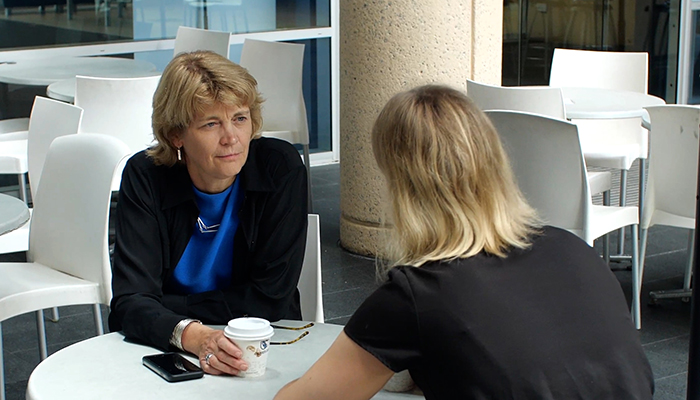Understanding individual differences between people that are caused by genetic factors, and the consequences thereof
Prof Peter Visscher and Prof Naomi Wray together are directors of the Program in Complex Trait Genomics Group (PCTG), funded as an NHMRC Program Grant 2017-2021, an ARC Laureate Fellowship 2019-2024 (Visscher) and an NHMRC senior Investigator Grant (Wray).
The Executive Team comprises Profs Visscher and Wray, Dr Anjali Henders, Human Studies Unit Manager, A/Prof Allan McRae (ARC Future Fellow) and A/Prof Loic Yengo (ARC DECRA Fellow).
The PCTG comprises a critical mass of more than 40 postdoctoral researchers, research assistants and HDR students, all supported by external grant funding.
PCTG has particular strengths in a number of research areas, including statistical genomics (Dr Loic Yengo, ARC DECRA Fellow; Dr Jian Zeng, NHMRC Early Career Fellow), genetics of gene regulation (A/Prof Allan McRae, ARC Future Fellow), systems genomics and cardiovascular disease (Dr Sonia Shah, NHMRC Early Career Fellow), neurological and psychiatric genomics (Dr Enda Byrne, NHMRC Early Career Fellow 2013-2017; Dr Fleur Garton, NHMRC Early Career Fellow) and Biobank Genomics (Dr Kathryn Kemper).
Key breakthroughs & discoveries
Missing heritability GCTA: A Tool for Genome-wide Complex Trait Analysis 10 years of GWAS discovery Genetic relationship between psychiatric disorders in collaboration with the International Schizophrenia Consortium and the Psychiatric Genomics Consortium - 1 Genetic relationship between psychiatric disorders in collaboration with the International Schizophrenia Consortium and the Psychiatric Genomics Consortium - 2 Genetics of depression in collaboration with the Psychiatric Genomics Consortium
We share our research through
Volunteers needed for Australia-wide COVID study

Find out more >
Group leaders

Professor Peter Visscher
Group Leader, Program in Complex Trait Genomics
+61 7 334 62635
peter.visscher@uq.edu.au
UQ Experts Profile

Professor Naomi Wray
Group Leader, Program in Complex Trait Genomics
+61 7 334 62635
naomi.wray@uq.edu.au
UQ Experts Profile
Genetics of depression
Polygenic risk
MND Research Update
Big data genomics
Our Human Studies Unit supports main researchers locally and nationally in data collection studies and in generation of genomic data in large samples.
PhD scholarships may be available. Email us with your CV and why we are the right group for you.
Our Approach
The Visscher laboratory specialises in developing methodology that enables analyses aimed at understanding the genetic basis of differences in risk for disease, and other phenotypes between individuals. This research crosses the boundaries of quantitative and statistical genetics, population genetics and human genetics. Applications are diverse but include the study of anthropometric traits, cognition, and disorders of the brain.
The Wray laboratory focusses on understanding the genetic contribution to psychiatric and neurological disorders. The group specialises in applying new analytical methods of genomic data to provide insights into these complex disorders, with an ultimate goal to improve diagnosis, prognosis and treatments. The lab plays a key role in the international Psychiatric Genomics Consortium and Prof Wray co-leads the sporadic ALS Australia systems genomics consortium (SALSA), funded by the IceBucket Challenge and FightMND.
Research Areas
Our Program is broadly interested in understanding individual differences between people that are caused by genetic factors, and the consequences thereof. The fundamental questions underlying our research are:
- Why do some people get disease and others do not?
- Why do some people progress fast in their disease and others do not?
- Why do some people respond to treatment for disease and others do not?
We also work on model traits to understand the genetic and evolution of comlex traits:
- Why are some people tall and others short?
- Why do some people express more of gene X in cell-type Y than others?
- How is variation maintained in populations given forces of natural selection, mutation, drift and non-random mating?
- How do we detect signatures of natural selection, mutation, drift and non-random mating in genomic data?
Our research programme focuses on methodology in statistical and quantitative genetics and application of new methods and new kinds of genetic & genomic data to answer important scientific questions. Applications include dissection of genetic variation underlying cognition and quantifying and deciphering the genetic architecture of psychiatric, neurological and other disorders.
News
-
-
Debunking autism myths rewarded with national prize
30 November 2022 -
IMB grows two Young Tall Poppies
30 August 2022
General enquiries
+61 7 3346 2222
imb@imb.uq.edu.au
Media enquiries
IMB fully supports UQ's Reconciliation Action Plan and is implementing actions within our institute.
Support us
Donate to research
100% of donations go to the cause















